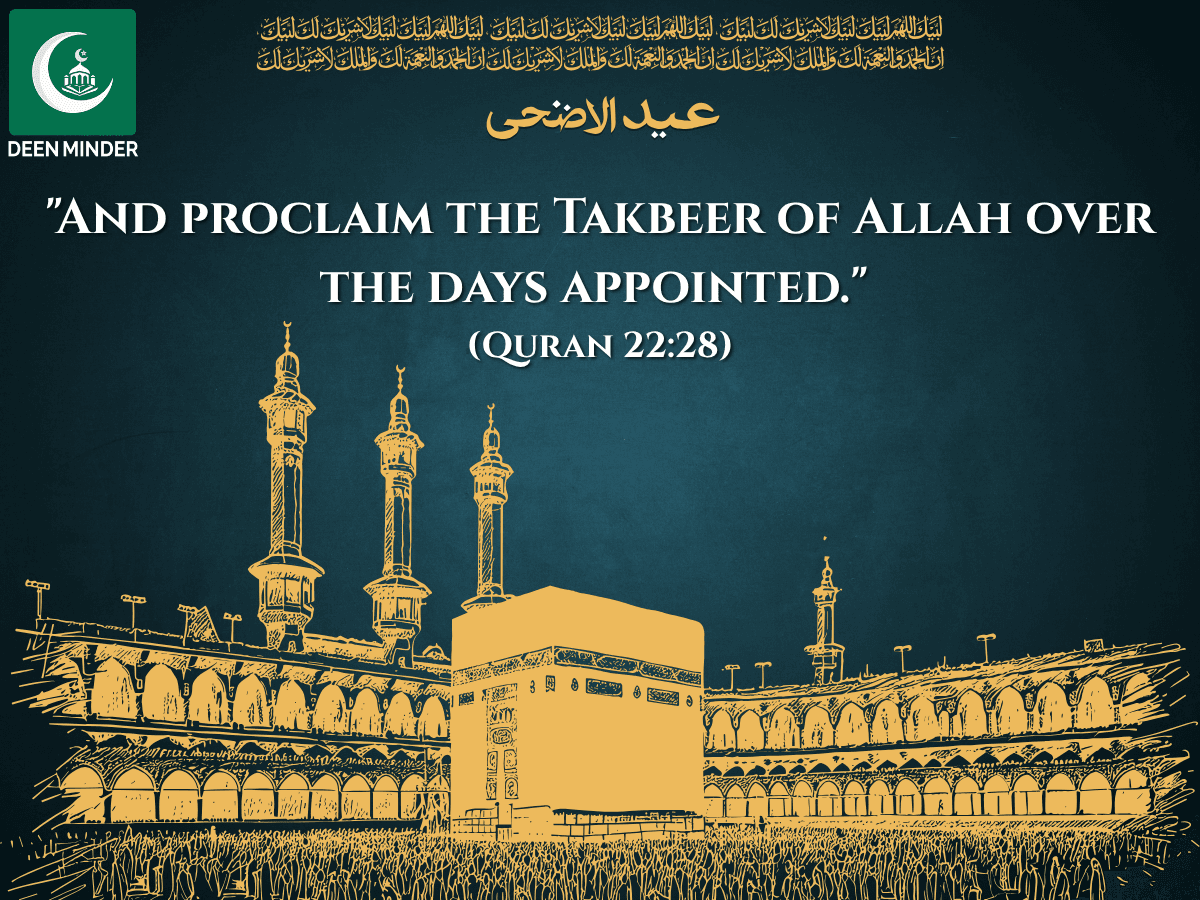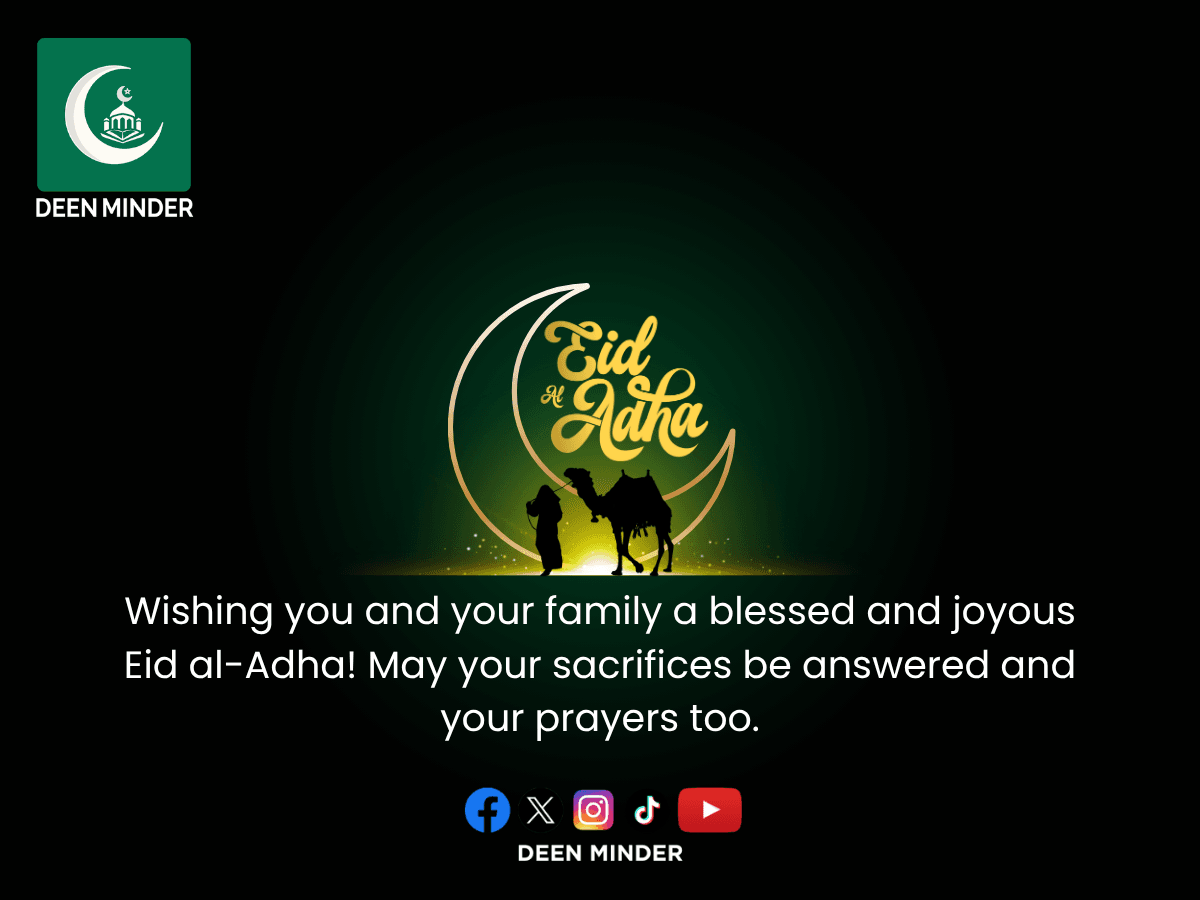Here comes the day of Eid, the day of celebration, the day of offering sacrifice, the day of remembrance of Allah, the greatest day in the sight of Allah. We ask Allah to make us witness a lot of it on earth. However, there are some etiquettes of Eid Al Adha that have been forgotten, or some intentionally don’t do it, which is wrong. We are going to mention the things to do on the day of Eid Al Adha today in shaa Allah.
The reason is because a lot of people see this great day as a day of celebration and eating meat only. The greatest day in the sight of Allah! Using it to eat meat only, without performing any rewarding activities in it. This is totally bad. Eid Al-Adha is not just about festive gatherings, delicious dishes, or wearing new garments only. It’s a sacred day of sacrifice, devotion, and submission to Allah.
It is a day to celebrate the test of faith undergone by Prophet Ibrahim (عليه السلام). It was about complete obedience and total surrender to the will of Allah. Upon this, our Prophet ﷺ celebrated it and did a lot of things on this great day. This is why we need to revive the sunnah of our Prophet ﷺ by reviving the things to do on the day of Eid Al Adha.
Sunnah etiquettes of Eid Al Adha (things to do on the day of Eid Al Adha)
By following these etiquettes of Eid Al Adha, you are reviving the Sunnah of our beloved Prophet Muhammad ﷺ. Below are 11 authentic things to do on the day of Eid Al Adha, each backed by authentic sources and timeless wisdom.
1. Reciting the Takbeerat: Proclaiming Allah’s greatness until the days of Tashreeq
The Takbeer is among the most distinguishing etiquettes of Eid Al Adha. It is to be recited from the first night, 1st of Dhul Hijjah, until the Asr of the 13th. This Sunnah should be done in the streets, homes, mosques, and other places allowed to mention Allah’s name during these blessed days. Allah says:
“And proclaim the Takbeer of Allah over the days appointed.” (Quran 22:28)
Ibn ‘Abbas رضي الله عنه said, “Remember Allah during the well-known days; i.e., the first ten days of Dhul-Hijjah, and also the fixed number of appointed days; i.e. the days of Tashriq.”
Ibn ‘Umar and Abu Hurairah used to go out to the market saying Takbir during the first ten days of Dhul-Hijjah and the people would say Takbir after their Takbirs. Muhammad bin ‘Ali used to say Takbir after Nawafil.
The recommended dhikr is:
اللَّهُ أَكْبَرُ، اللَّهُ أَكْبَرُ، لاَ إِلٰهَ إِلاَّ اللّهُ، وَاللَّهُ أَكْبَرُ، اللَّهُ أَكْبَرُ وَلِلَّهِ الْحَمْدُ
Allahu Akbar, Allahu Akbar, La ilaha illAllah, Allahu Akbar, Allahu Akbar wa Lillahil Hamd.
Whether you’re driving, walking, or working, moisten your tongue by saying the above Dhikr. But make sure that you are not saying it in places where mentioning Allah’s name is prohibited, like the toilet, bathroom, or dustbin.
2. Perform Ghusl (Ritual Bath) before the Eid Prayer
One of the well-established etiquettes of Eid Al Adha is performing ghusl (ritual purification) before heading out for the Eid prayer. It is a confirmed Sunnah, as reported in some books of hadiths.
Nafi’ reported: Abdullah ibn Umar, may Allah be pleased with him, used to perform a ritual bath on the day of Eid before he would depart for prayer. (Al-Muwatta 609, authentic according to Al-Nawawi)
Imam al-Nawawi commented, “The narrations of Al-Shafi’i and his companions agree upon the recommendation to perform a ritual bath on the day of Eid (Al-Majmu’ Sharh al-Muhadhdhab 5/7)
3. Dress in your best clothes (it doesn’t necessarily need to be new)
Among the beautiful things to do on the day of Eid Al Adha is to wear your best clothes. Not necessarily new, but clean, modest, and dignified. Ibn Umar رضي الله عنه narrated that the Prophet ﷺ would wear his best cloak on the two Eids (al-Bayhaqi).
“The Messenger of Allah ﷺ used to wear his best clothes on the two Eids.” (Al-Bayhaqi in Shu’ab al-Iman)
Sheikh Ibn Baaz رحمه الله emphasized that wearing the best available clothes without arrogance or wastefulness is Sunnah. This is among the beautiful things to do on the day of Eid Al Adha that reflects the honor of the occasion.
Avoid extravagance or imitating non-Islamic fashion trends. The key is to appear in a way that reflects dignity, gratitude, and the honor of the day.
4. Apply perfume (men only) – A forgotten sunnah
For men, wearing fragrance before attending the Eid prayer is a highly recommended Sunnah. The Prophet ﷺ loved perfume and encouraged it on blessed occasions. The Prophet ﷺ would always smell pleasant, especially during major gatherings like Jumu’ah and Eid. Our Prophet recommended using perfume on Eid day, even using it in our weekly Eid that we observe called Jumua’h.
“The Messenger of Allah (ﷺ) said: ‘This day is an ‘Eid (festival) which Allah has ordained for the Muslims. Whoever comes to Friday (prayer), let him take a bath and if he has perfume then let him put some on. And upon you (I urge to use) is the tooth stick.” (Sunan Ibn Majah, 1098)
However, it is strictly prohibited for women to wear perfume outside their homes. Women are not permitted to wear perfume outside the house, as warned in authentic hadiths. This preserves modesty and safeguards the gathering. The Prophet ﷺ said:
“Every eye can commit adultery. The woman who adorns herself with fragrances to pass by an assembly of men is as such,” meaning an adulteress.” (Sunan al-Tirmidh 2786 – Sahih by Al-Albani)
So this Sunnah is specific to men as part of their outward adornment and respect for the blessed day.
5. Avoid eating before the Eid Al Adha Prayer
How many people know that this sunnah is among some of the etiquettes of Eid Al Adha? Unlike Eid al-Fitr, where it is Sunnah to eat before the prayer, the Prophet ﷺ would not eat on Eid Al Adha until after the prayer, from the meat of his sacrifice.
“The Messenger of Allah ﷺ used to eat after returning from the Eid prayer, from the meat of his sacrifice.” (Tirmidhi)
This powerful Sunnah connects your first bite of the day to the remembrance of Prophet Ibrahim’s عليه السلام sacrifice and the reward of reviving a prophetic tradition.
6. Walk to the Eid Prayer and Take Different Routes
Not everybody knows that this sunnah is part of the etiquettes of Eid Al Adha. Jabir ibn Abdullah رضي الله عنه reported:
“On the day of Eid, the Prophet ﷺ used to take a different route going and coming back from the Eid prayer.” (Bukhari)
Walking to the prayer area reflects humility and eagerness to worship. Taking different routes also ensures the spreading of the light of Eid and meeting more people with greetings of peace. This modest Sunnah is one of the most unknown etiquettes of Eid Al Adha.
It was said that Imam Ibn Qayyim رحمه الله commented that this was to spread the greeting of peace, meet more people, and to revive the public remembrance of Allah. Some scholars also mentioned it serves as a testimony of your worship to the places you pass by, based on the verse:
“That Day, it will report its news.” (Surah Az-Zalzalah 99:4)
7. Offering the Eid Prayer in congregation
The Eid prayer is one of the most important etiquettes of Eid Al Adha, and neglecting it without a valid reason is a serious loss. However, scholars differ on whether it is obligatory or not. Among the most appropriate things to do on the day of Eid Al Adha is observing the prayer itself. This is the sunnah of our Prophet ﷺ and his companions. Allah says
So pray and sacrifice to your Lord ˹alone˺. (Quran 108:2)
Our Prophet ﷺ also commanded all women, both clean and unclean ones, to come out to the Eid place, but the unclean should keep back and keep saying the dhikr only.
The Messenger of Allah (ﷺ) commanded us to bring out on’Id-ul-Fitr and ‘Id-ul-Adha young women, menstruating women and screened away ladies, menstruating women kept back from prayer, but participated in goodness and supplication of the Muslims. I said: Messenger of Allah, one of us does not have an outer garment (to cover her face and body). He said: Let her sister cover her with her outer garment. (Sahih Muslim, 890 c)
If someone misses it due to lateness, the person may pray two rak’ahs individually, but the reward of the congregation and khutbah will be missed.
8. Listen attentively to the Eid khutbah
This is mostly ignored among the etiquettes of Eid Al Adha. After finishing the prayer, you will see a lot of people going to their houses directly, or you will see some people after getting food from those distributing it. It is wrong for those distributing it too soon after the prayer. It should be done after the Khutbah. This is among the things to do on the day of Eid Al Adha because it will serve as a sermon and reminder to us.
Abu Sa’eed Al-Khudri reported:
“The Prophet ﷺ used to go out on the day of Eid al-Fitr and Eid al-Adha to the prayer place, and the first thing he would do was to pray. Then he would turn to the people, and they would remain sitting in their rows while he gave them the khutbah.” (Bukhari and Muslim)
Listening attentively is part of showing respect for the teachings and gaining guidance. Many scholars, including Al-Albani رحمه الله, emphasized that leaving immediately after prayer without attending the khutbah is against the Sunnah of Eid Al Adha. It is highly recommended to listen to the Khutbah after the Eid Solah.
9. Offer the Udhiya (sacrifice) sincerely for the Sake of Allah if you are capable
Of course, the ultimate act of Eid Al Adha is the sacrifice (Qurbani), a revival of Prophet Ibrahim’s عليه السلام legacy of submission. The sincere intention behind it is everything. Sheikh Salih al-Fawzan حفظه الله says: “It is a ritual of worship, not just meat distribution. The sincerity is what counts.”
So pray and sacrifice to your Lord ˹alone˺. (Quran 108:2)
The Prophet (ﷺ) said (on the day of Eid Al Adha), “The first thing we will do on this day of ours is to offer the (`Id) prayer and then return to slaughter the sacrifice. Whoever does so, he acted according to our Sunna (tradition), and whoever slaughtered (the sacrifice) before the prayer, what he offered was just meat he presented to his family (Bukhari)
Make sure your intention is solely for Allah. Choose a healthy animal, one that has reached the age requirement of the sacrificial animal, follow the proper rulings, and try to give to the needy, too. It’s not just a tradition but an act of worship.
“Their meat will not reach Allah, nor will their blood, but what reaches Him is piety from you…” (Surah Al-Hajj 22:37)
This makes it one of the most recommended things to do on the day of Eid Al Adha.
10. Spread Joy: Greet Others, Visit Family, and Share the Meat
Eid is a day of joy, and one of the best things to do on the day of Eid Al Adha is to spread Salam, give gifts, visit relatives, and bring happiness to others. It is encouraged to greet one another with love, share the blessings of food, and maintain family ties, especially on Eid. All these acts embody the true etiquettes of Eid Al Adha.
Saying ‘Taqabbal Allahu minna wa minkum (may Allah accept from you and us )’ is also accepted. Although not reported from the Prophet ﷺ but some of the companions did this. Al-Haafidh Ibn Hajr Al-Asqalani (rahimahullah) said:
“We have related in “Mahaamiliyaat” with a chain of narration that is hasan, from Jabyr ibn Nufayr who said: ‘When the companions of Allah’s Messenger (ﷺ) met on the day of ‘eid, they would say to each other, ‘Taqabbal Allahu minna wa minkum (may Allah accept from you and us ).” [Al Mahamiliyyat; hasan isnad; see Fath ul Bari 2:446]
The Prophet ﷺ said…
” Don’t sever relations of kinship, don’t bear enmity against one another, don’t bear aversion against one another and don’t feel envy against the other and live as fellow-brothers as Allah has commanded you. (Sahih Muslim, 2563 d)
We should use this day as a means of upholding brotherhood among us by sharing love, gifts, visiting one another, and engaging in many other good deeds.
11. Engage in halal leisure if possible.
Eid is a time of celebration, but within the boundaries of Islam. Aisha رضي الله عنها narrated that the Prophet ﷺ let her watch the Abyssinians performing with their spears in the mosque on Eid.
“On the day of Eid, the Abyssinians were playing with spears in the mosque. The Prophet ﷺ let me watch them while he stood shielding me with his cloak, and he encouraged them to continue.” (Sahih Muslim)
The Prophet ﷺ said, “That the Jews may know that there is flexibility in our religion. Verily, I have been sent with a natural, lenient religion.” (Musnad Ahmad 24854)
Laughter, games, and family fun when halal are things allowed to do on the day of Eid Al Adha that enrich the mood and bring hearts closer together. It should be done within the boundaries of Islam. That is, the following should not be involved…
- Betting
- Showing one’s nakedness
- Alcohol
- Dangerous injurious games
- Singing with musical instruments (allowed for women on Eid day only, and should not involve any musical instruments)
- And any known haram things should not be involved.
Eid Al Adha is not just a day of celebration, but a day marked by the legacy of submission, sacrifice, and sincerity. From the early morning takbeeraat to the final good deed of the day, every moment is a chance to earn Allah’s pleasure. By engaging in these Sunnah etiquettes of Eid Al Adha, you’re reviving the Sunnah and the guidance of our Prophet Muhammad ﷺ, and the way of the righteous Sahabah.
But don’t forget to heed the warnings against common mistakes. Guard your day from sins, extravagance, and heedlessness. Let this Eid be a bridge that connects you more to Allah, not a break from Him.
We ask Allah to accept our sacrifice from us. Make it a source of reward for us on the day we meet Him. Grant us sincerity in our words and deeds. Allow us to witness many more Eids while we remain in His obedience and pleasure. Aameen.


